

LESSON PLANNING. Teaching Graphic Novels. Lit Bits » Blog Archive » Teaching Literature: Student Contexts and Discussion Openers. Today’s guest blogger is Ben Bunting, a Ph.D. candidate in English literature at Washington State University where he teaches undergraduate courses in Composition and Literature.
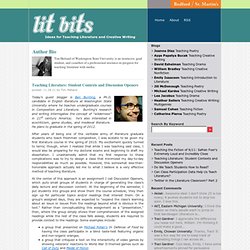
Bunting’s research and writing interrogates the concept of “wilderness” in 21st century America; he’s also interested in ecocriticism, game studies, and medieval literature. He plans to graduate in the spring of 2012. After years of being one of the veritable army of literature graduate students who teach freshman composition, I was ecstatic to be given my first literature course in the spring of 2010. My excitement quickly turned to terror, though, when I realized that while I was teaching said class, I would also be preparing for my doctoral exams and beginning to draft my dissertation. I unashamedly admit that my first response to these complications was to try to design a class that minimized my day-to-day responsibilities as much as possible. Providing Background Knowledge: Effective Scaffold or Spoon-feeding?
Two weeks ago I looked at one of the recommendations found in the Common Core Standards Publisher’s Criteria for Grades K-2 and 3-5, which attempt to lay out some guidelines for designing Standards-based reading curriculum.
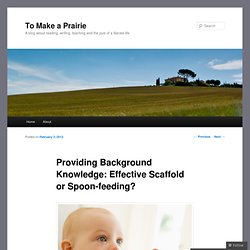
In addition to questioning strategy instruction, both Criteria also offer caveats against front-loading information or engaging students in pre-reading activities that provide them with access to a text’s ideas without actually grappling with the text itself. Like the criteria about comprehension strategies, questioning front-loading is a ‘biggie,’ especially when it comes to providing background knowledge which students might not have. No less an expert than Doug Lemov, for instance, the author of the hugely popular Teach Like a Champion, cites pre-teaching background material as one of the techniques effective teachers use. Literary Appreciation + Literary Analysis: A Course Plan « Classroom as Microcosm. Regular commenter Crystal has asked for some more details about my Personal Narrative course, in which I focus less on literary analysis and more on literary appreciation.
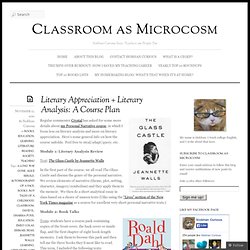
Here’s some general info on how the course unfolds. Feel free to steal/adapt/query, etc. Module 1: Literary Analysis Review Text: The Glass Castle by Jeannette Walls In the first part of the course, we all read The Glass Castle and discuss the genre of the personal narrative. Module 2: Book Talks Texts: students have a course pack containing copies of the front cover, the back cover or inside flap, and the first chapter of eight book-length memoirs. I assign one book to each student, so each book is read by a group of 4-5 students. Plot summary: this is a challenging topic, because you will need to give a detailed enough summary to intrigue the audience, but you can’t give everything away! Module 3: Comparison Text: each student chooses a second book from the list above.
Teacher's Guides and Analysis Tool - For Teachers. Mashups in the Literature Classroom. Let me say right away that this post will focus on an exercise I’ve used in my literature classes.
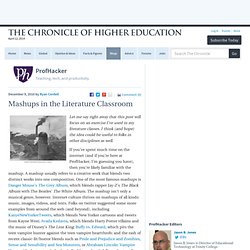
I think (and hope) the idea could be useful to folks in other disciplines as well. If you’ve spent much time on the internet (and if you’re here at ProfHacker, I’m guessing you have), then you’re likely familiar with the mashup. A mashup usually refers to a creative work that blends two distinct works into one composition. One of the most famous mashups is Danger Mouse’s The Grey Album, which blends rapper Jay-Z’s The Black Album with The Beatles’ The White Album. The mashup isn’t only a musical genre, however.
The best mashups juxtapose materials deliberately; they make the implicit explicit. Scholarly Work on Teaching and Learning Award Takes on “Content Coverage” June 6, 2012 By: Maryellen Weimer, PhD in Teaching Professor Blog Each year Magna Publications sponsors an award recognizing an outstanding piece of scholarly work on teaching and learning.
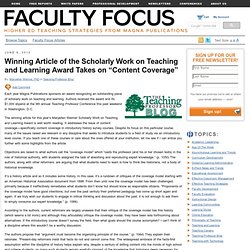
Authors received the award and its $1,000 stipend at the 9th annual Teaching Professor Conference this past weekend in Washington, D.C. The winning article for this year’s Maryellen Weimer Scholarly Work on Teaching and Learning Award is well worth reading. It addresses the issue of content coverage—specifically content coverage in introductory history survey courses. Objections are raised to what authors call the “coverage model” which “casts the professor (and his or her chosen texts) in the role of historical authority, with students assigned the task of absorbing and reproducing expert knowledge.” It’s a history article and so it includes some history. The authors propose that “argument must become the organizing principle of the course.” Reference: Sipress, J. Literature Study Guides (A) Ten Fun Ways to Use YouTube Videos in an Online Literature Class.
April 2, 2012 By: Yvonne Ho in Teaching with Technology I have always enjoyed watching YouTube videos and when I noticed that some of the videos dealt with serious literary topics and had re-enactments of Shakespeare plays, I began to wonder if I could incorporate them into my literature classes.
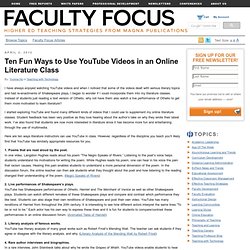
Instead of students just reading a text version of Othello, why not have them also watch a live performance of Othello to get them more motivated to learn literature? I started exploring YouTube and found many different kinds of videos that I could use to supplement my online literature classes. Student feedback has been very positive as they love hearing about the author’s take on why they wrote their latest work. Here are ten ways literature instructors can use YouTube in class. 1. 2. 3. 4. 5. 6. 7. 8. 10.
Yvonne Ho is a full time Associate English Composition/Literature French Professor at American Public University System (APUS) The Best of the Humanities on the Web. Open Shakespeare. Ten Fun Ways to Use YouTube Videos in an Online Literature Class.